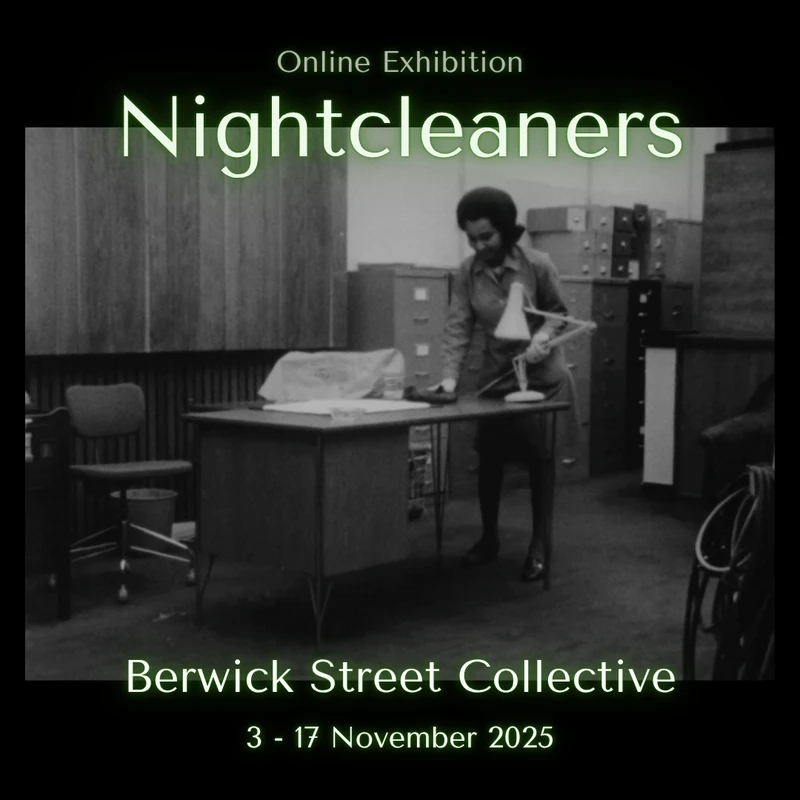Berwick Street Collective: Nightcleaners (Part 1)
3 Nov-17 Nov 2025


In collaboration with Aliaskar Abarkas, LUX is delighted to mark the 50th anniversary of ‘Nightcleaners (Part 1)’ (1975) with a special online exhibition from 3 to 17 November 2025. Created by the Berwick Street Collective (Marc Karlin, Mary Kelly, James Scott and Humphry Trevelyan), the film remains a landmark of 1970s political cinema.
Register here to access ‘Nightcleaners (Part 1)’ by Berwick Street Collective.
Intended as a campaign film about women office cleaners fighting for fair pay and union rights, ‘Nightcleaners’ evolved into a deeply reflexive work. The film questions how struggles for visibility and justice could be represented, and how both filmmakers and audiences are implicated in those struggles. Fifty years on, the film continues to resonate with urgent questions around precarious labour, collective action and solidarity.
This online exhibition has been developed in dialogue with artist Aliaskar Abarkas, who invited LUX to revisit ‘Nightcleaners’. This invitation led to a development of his new initiative ‘Speak Louder’, a working group at LUX bringing together artists, cultural workers and creatives to reflect on the material and emotional conditions of artistic labour today.
Abarkas will facilitate the working group from November 2025 to May 2026 as part of his Collection Engagement Residency at LUX. The group will meet regularly and culminate in a public sharing in spring 2026.
The open call for ‘Speak Louder’ will remain live throughout the online exhibition period (3-17 November). [Learn more and apply here.]
About the artists
The Berwick Street Film Collective was formed in 1970 through a collaboration between filmmakers James Scott, Marc Karlin and Humphry Trevelyan, later joined by Mary Kelly from the night cleaners campaign group. The collective initially came together around the production of Nightcleaners (Part 1), although the members came from diverse backgrounds: Karlin and Trevelyan had previously worked with the political filmmaking group Cinema Action; Kelly was an artist involved with the leafleters group; Scott had made independent films; Richard Mordaunt, (also from Cinema Action), while not part of the Nightcleaners production, created his own film Ireland ‘Behind the Wire’. The collective’s approach was both collaborative and individual, contributing to what became known as the avant-garde of British documentary film in the 1970s.
Influenced in part by film makers like Godard and Marker, their films dealt with some of the major political/cultural issues of the day, such as the conflict between groups of under-represented workers and working-class communities, and the political hierarchies in the trade unions and governments (Nightcleaners 1974): the internment of Republican activists in the north of Ireland by the British government, and the growth of a new Republican consciousness (Ireland Behind the Wire): and the experience of immigrant families in West London (36 to 77).
‘Nightcleaners’ achieved considerable fame or notoriety, depending on the audience’s response to its radical contestation of the then-established orthodoxy of observational film in British television. It was one of the first British documentaries to make the examination of the means of filmic representation a central part of its purpose and structure. It remains as one of the landmark films of the period, and signalled the beginning of what is often called the reflexive tradition in documentary film in the UK.
Aliaskar Abarkas is an Iranian artist based in London.
Rooted in alternative and communal art education, his practice stages choreographic encounters that move from individual elements into collective expression. Often in dialogue with historical sources, Abarkas builds collaborative frameworks that invite participants to interpret and activate inherited scores through music, exhibition, and performance making.
He is currently an associate artist at Sadler’s Wells / Rose Choreographic School (London, 2024–26) and the Lead Artist at Autograph Gallery (Acts of Solidarity, in partnership with All Changes, London, 2025–28). He holds a BA in Visual Cultures from the University of Tehran and an MA in the Theory of Contemporary Art and Politics from Goldsmiths, University of London. Previous residencies include Cubitt Gallery and the Swiss Church (London). Abarkas has also been an associate artist with Rupert (Lithuania), the Institute of Postnatural Studies (Madrid), Castro (Rome), Open School East, and Syllabus V (UK), among others.
His interventions and collaborations have been supported by institutions including the Barbican Centre, ICA, The Mosaic Rooms, TACO!, Pushkin House (London), CAPC (Bordeaux), LOCALES (Rome), and CIRCA. Upcoming projects include commissions and collaborations with Scuola Piccola Zattere (Venice), Arts Catalyst (Sheffield), the Singapore Art Museum, and LUX (London).
Accessibility Information
The film is available with open captions.
If you have any access needs to experience our online exhibition, please email us at events[at]lux.org.uk or call us at +44(0)20 3141 2960.